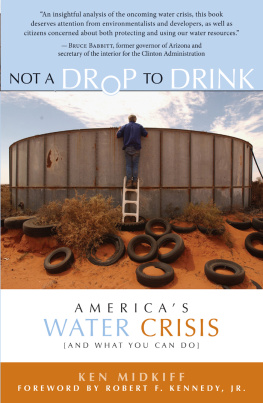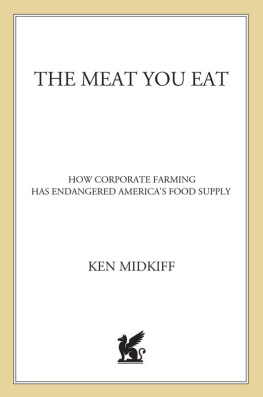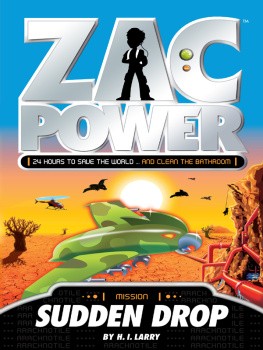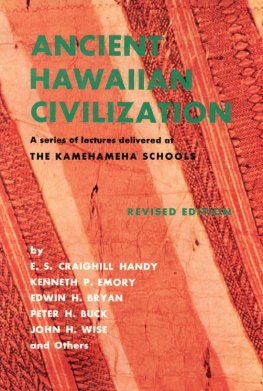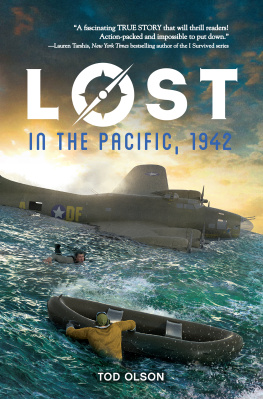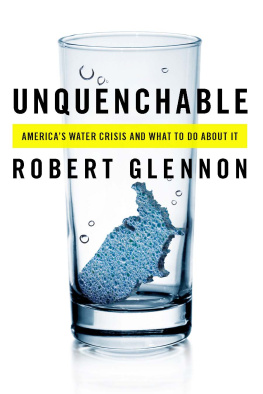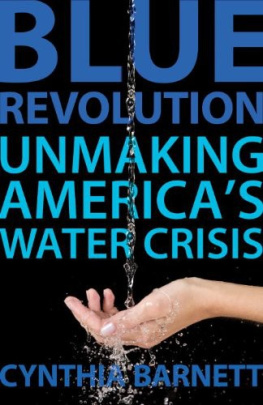Ken Midkiff - Not a Drop to Drink: Americas Water Crisis (and What You Can Do)
Here you can read online Ken Midkiff - Not a Drop to Drink: Americas Water Crisis (and What You Can Do) full text of the book (entire story) in english for free. Download pdf and epub, get meaning, cover and reviews about this ebook. year: 2007, publisher: New World Library, genre: Politics. Description of the work, (preface) as well as reviews are available. Best literature library LitArk.com created for fans of good reading and offers a wide selection of genres:
Romance novel
Science fiction
Adventure
Detective
Science
History
Home and family
Prose
Art
Politics
Computer
Non-fiction
Religion
Business
Children
Humor
Choose a favorite category and find really read worthwhile books. Enjoy immersion in the world of imagination, feel the emotions of the characters or learn something new for yourself, make an fascinating discovery.
- Book:Not a Drop to Drink: Americas Water Crisis (and What You Can Do)
- Author:
- Publisher:New World Library
- Genre:
- Year:2007
- Rating:3 / 5
- Favourites:Add to favourites
- Your mark:
- 60
- 1
- 2
- 3
- 4
- 5
Not a Drop to Drink: Americas Water Crisis (and What You Can Do): summary, description and annotation
We offer to read an annotation, description, summary or preface (depends on what the author of the book "Not a Drop to Drink: Americas Water Crisis (and What You Can Do)" wrote himself). If you haven't found the necessary information about the book — write in the comments, we will try to find it.
Ken Midkiff: author's other books
Who wrote Not a Drop to Drink: Americas Water Crisis (and What You Can Do)? Find out the surname, the name of the author of the book and a list of all author's works by series.
Not a Drop to Drink: Americas Water Crisis (and What You Can Do) — read online for free the complete book (whole text) full work
Below is the text of the book, divided by pages. System saving the place of the last page read, allows you to conveniently read the book "Not a Drop to Drink: Americas Water Crisis (and What You Can Do)" online for free, without having to search again every time where you left off. Put a bookmark, and you can go to the page where you finished reading at any time.
Font size:
Interval:
Bookmark:

WATER CRISIS


Copyright 2007 by Ken Midkiff
All rights reserved. This book may not be reproduced in whole or in part, stored in a retrieval system, or transmitted in any form or by any means electronic, mechanical, or other without written permission from the publisher, except by a reviewer, who may quote brief passages in a review.
Cover design by Laura Beers
Interior design by Madonna Gauding
Library of Congress Cataloging-in-Publication Data
Midkiff, Kenneth.
Not a drop to drink : Americas water crisis (and what you can do) / Ken Midkiff.
p. cm.
Includes bibliographical references and index.
ISBN 978-1-930722-68-2 (pbk. : alk. paper)
1. Water-supplyUnited States. 2. Water rightsUnited States. 3. Water consumptionUnited States. 4. Water resources developmentUnited States.
I. Title.
TD223.M489 2007
363.610973dc22
2007020953
First printing, June 2007
ISBN-10: 1-930722-68-0
ISBN-13: 978-1-930722-68-2
Printed in Canada on 100% postconsumer-waste recycled paper
 New World Library is a proud member of the Green Press Initiative.
New World Library is a proud member of the Green Press Initiative.
10 9 8 7 6 5 4 3 2 1
Charlie; and my grandchildren, Simon, Eben, and Chloe.
INTRODUCTION
The Current State of Emergency
Facing the American Water Supply
1. TAKING WHAT IS NOT THERE
Promises of Hypothetical Water in the West
2. THE WELLS RUN DRY
The Time Is Up in the High Plains
3. CROPS DONT GROW WITHOUT WATER
The Uncertain Future of American Agriculture
4. WATER WARS
Regional Battles Sweep the Nation
5. PRIVATIZATION
The Risks of Putting Our Water Supply into Corporate Hands
6. GLOBAL WARMING
The Wild Card That Could Leave Us Flooded or Parched
7. TECHNOLOGICAL SOLUTIONS
The Skyrocketing Cost of a Glass of Water
AFTERWORD
Immediate Collective Action Is Our Only Hope
T he struggle over the worlds water resources will be the defining struggle of the twenty-first century, and the battle has already been joined.
In 1999, following the advice of the World Bank, the Bolivian government allowed the city of Cochabamba in Bolivia to contract with a subsidiary of the Bechtel company to take over the citys public water supply. The company, composed primarily of British investors, immediately raised water rates, causing extreme hardship for all but the citys wealthiest citizens. The outcome, unexpected by Bechtel as well as the Bolivian government, was otherwise predictable: the public revolted against the rising rates. Massive street protests pitted rock-throwing mobs of Cochabambas poor against riot police who maimed or killed them. This mini-revolution caused Bolivias government to collapse and rescind the privatization of the citys water. Was this a communist mob bent on nationalizing legitimate private property? Hardly. Cochabambas citizens were engaged in the most fundamental fight for democratic rights.
The best measure of how a democracy functions is how it distributes the goods of the land: the air, waters, wandering animals, fisheries, and public lands, otherwise known as the public trust or the commons. By their nature these resources cannot be reduced to private property but are the shared assets of all the people, held in trust for future generations. Since ancient times, the laws of all just and equitable nations have protected these public trust assets as the property of all citizens, humble and noble, rich and poor alike; everyone has the right to use the commons in a way that does not diminish its use by others.
Ancient Roman law, our earliest legal heritage, held that the most fundamental natural, or God-given, law required that the air, running water, the sea, and consequently the sea shore could not be owned as private property but were common to all Roman citizens. The Romans vigorously protected the waterways and the resources of the sea, seashore, estuaries, wetlands, and fisheries from control by private individuals.
The first acts of a tyranny invariably include efforts to privatize the commons. Despotic governments typically allow favored persons or powerful entities to capture and consolidate the public trust and steal the commonwealth from the public.
Following Romes collapse, Europes kings and feudal lords appropriated public trust assets, including rivers and streams, and dispensed them without regard to public rights. In the early years of the thirteenth century, Britains King John fenced in Englands forests and streams, erected navigational tolls, and placed weirs in the rivers in order to sell private monopolies to the fisheries. The exclusion of the public from the rivers and waterways and the stifling of commerce that ensued helped prompt a citizens revolt. In 1215 the English barons trounced King John at Runnymede and forced him to sign the Magna Carta, which guaranteed the personal liberties of the people of England. Centuries later the Magna Carta served as the blueprint for the Bill of Rights in the U.S. Constitution.
Among the rights reaffirmed by the Magna Carta were liberty of navigation and a free fishery, so that, according to Britains seminal legal authority, William Blackstone, the rivers that were fenced [by the king] were directed to be laid open. Thirteenth-century Spanish law likewise ensured the public inalienable rights in rivers, springs, and shores.
Additionally, the king could not sell public trust assets to a private party. The nineteenth-century legal scholar Henry Schultes described public trust rights as unalienable. He explained that things which relate to the public good cannot be given, sold, or transferred by the King to another person.
Following the American Revolution, each state became sovereign, inheriting from King George III the trusteeship of public land, waters, and wildlife within its borders. Both the federal government and the individual states recognized the public trust in their statutes and ordinances. For instance, Massachusettss Great Pond Ordinance of 1641 assured public access to all consequential water bodies, and the federal governments Northwest Ordinance of 1787 gave all U.S. citizens unrestrained access to all the tributaries of the St. Lawrence and Mississippi rivers and proclaimed that those waters and the carrying places between shall be common highways and forever free.
Like the citizens of Great Britain in 1215, Cochabambas citizens saw the privatization of the commons as a threat to their democracy and their lives. While privatization controversies in the United States have not yet provoked hot confrontations like those that occurred in Cochabamba, local public utilities across North America are even now conveying water supplies that have benefited from substantial public investment to private companies, often at fire-sale prices. In recent years, only vigorous protests by citizens have kept corporations from privatizing the water supplies in places like Lexington, Kentucky, and Stockton, California. Elsewhere, a more subtle but equally effective privatization of public trust waters is occurring, as governments subsidize reckless and unsustainable water usages that favor greedy developers, powerful utilities, and agribusiness barons over the American public. Ken Midkiff tells how destructive government policies are draining our nations rivers and aquifers and trampling our democratic rights.
Font size:
Interval:
Bookmark:
Similar books «Not a Drop to Drink: Americas Water Crisis (and What You Can Do)»
Look at similar books to Not a Drop to Drink: Americas Water Crisis (and What You Can Do). We have selected literature similar in name and meaning in the hope of providing readers with more options to find new, interesting, not yet read works.
Discussion, reviews of the book Not a Drop to Drink: Americas Water Crisis (and What You Can Do) and just readers' own opinions. Leave your comments, write what you think about the work, its meaning or the main characters. Specify what exactly you liked and what you didn't like, and why you think so.

